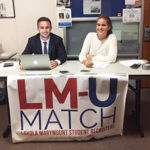
When Loyola Marymount University seniors Adam Betancourt and Allyson Davis joined the student chapter of Engineers Without Borders three years ago, they didn’t imagine the experiences that awaited them. Today, the group—now rebranded under the name Engineering For Humanity—has completed several projects to benefit underserved communities.
“It’s really fulfilling to see the outcome of our efforts,” said Betancourt, a mechanical engineering major and the organization’s president. “It’s incredible to see the things we’ve learned in the classroom put into action and actually help people.”
The LMU student chapter of Engineers Without Borders formed in 2009. But the students renamed the group last year to focus on humanitarian causes. “We want to develop into well-rounded, strong, confident engineers who have the experience of participating in humanitarian efforts,” Betancourt said.
In 2017, the group designed and built a meditation labyrinth on the grounds of Alexandria House, a transitional house for women and children in Los Angeles. They also recently worked with the support of Build a Miracle, a San Diego nonprofit organization, to develop a water drainage system in El Florido, an underserved community in Tijuana. About 25 students made the trip.
Engineering For Humanity is now at work planning a park in El Florido that will include a playing field, seating, grills, a garden and a playground that is accessible to disabled children. It’s a large-scale project involving many. Community members are contributing their skills. City representatives are providing leveling work, playground equipment and approving plans as necessary.
Even LMU faculty, beyond the group’s advisor, are lending their expertise. “For hydrology or soils or mechanical issues, we seek advice from professors who have that background,” said Betancourt. “We really couldn’t do this without the support of so many people.”
In addition to addressing the engineering challenges of the projects, the time spent interacting with the El Florido residents and learning about their needs has been valuable in developing good communication skills, Betancourt said.
“This has been a good way to get involved with service,” said Davis, a civil engineering major and the group’s vice president of domestic affairs. “I’ve gained a lot of hands-on experience to augment my education and apply what I’ve learned in a real-world setting.”
Although Betancourt and Davis will graduate this year, they have seen a recent infusion of enthusiastic, new members. They have opened the group to non-engineering majors so they can share and learn from other disciplines.





